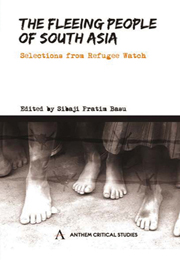Book contents
- Frontmatter
- Contents
- Acronyms and Abbreviations
- Foreword by Ranabir Samaddar
- Preface
- ETHICAL ISSUES
- Introduction
- Ethical Origins of Refugee Rights and Humanitarian Law
- Power, Fear, Ethics
- Victim's Right to Communicate
- The Guiding Principles: Normative Status and its Effective Domestic Implementation
- The Boundaries of Belonging: Reflections on Migration Policies in the Twenty-First Century
- LAWS
- SOUTH ASIA
- INDIA
- GENDER
- INTERVIEW/CORRESPONDENCE
- REPRESENTATIONS
- Index
Power, Fear, Ethics
from ETHICAL ISSUES
Published online by Cambridge University Press: 05 March 2012
- Frontmatter
- Contents
- Acronyms and Abbreviations
- Foreword by Ranabir Samaddar
- Preface
- ETHICAL ISSUES
- Introduction
- Ethical Origins of Refugee Rights and Humanitarian Law
- Power, Fear, Ethics
- Victim's Right to Communicate
- The Guiding Principles: Normative Status and its Effective Domestic Implementation
- The Boundaries of Belonging: Reflections on Migration Policies in the Twenty-First Century
- LAWS
- SOUTH ASIA
- INDIA
- GENDER
- INTERVIEW/CORRESPONDENCE
- REPRESENTATIONS
- Index
Summary
Below is the abridged text of an inaugural lecture given in a seminar on population movement and population displacement organized by the Northeast Regional Council of the Indian Council for Social Science Research, Shillong, 12–13 July 2001.
The reason why we should pay attention to the issues of power, fear and ethics in studies of ‘humanitarian politics’ – a name under which a significant chunk of the international politics of war and peace goes on is because without examination of these we cannot lodge human rights and humanitarianism at the heart of a politics of justice. I wish to inquire into the entire problematic in terms of a look into the management of refugee care. In the process, I also wish to continue my inquiry into the nature of constitutionalism and legalism of the existing kind that limits our capacity to resolve conflicts and generate an ethic of care, kindness, hospitality and responsibility.
The new mix of forced and illegal population flows and the inadequate appreciation of the new phenomenon in refugee studies raises the problem of method from several angles. It is important to note the following in this context. First, studies of forced population movements have been hitherto pursued from economic and demographic angles. The link between state formation (particularly postcolonial) and population flow cannot be seen through rose-tinted glasses. Second, the notion of forced is so narrowly defined, that the structural violence permeating these societies escapes our attention, though violence and coercion are considered as benchmarks in determination of refugees.
- Type
- Chapter
- Information
- The Fleeing People of South AsiaSelections from Refugee Watch, pp. 18 - 31Publisher: Anthem PressPrint publication year: 2009
- 1
- Cited by



